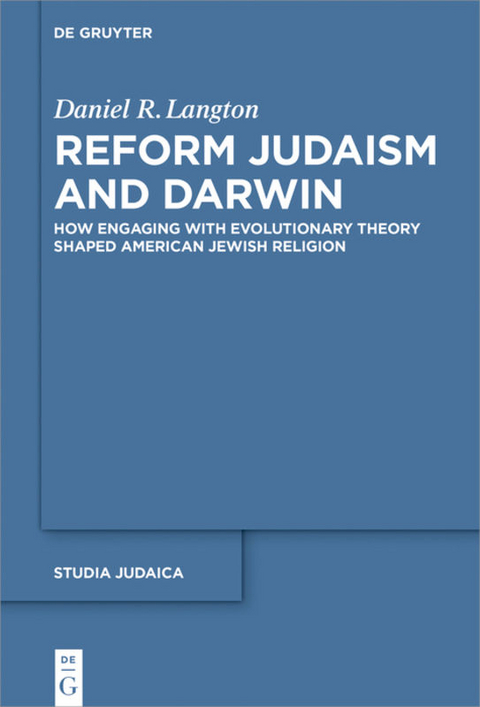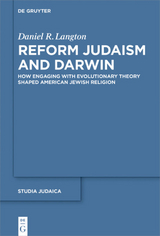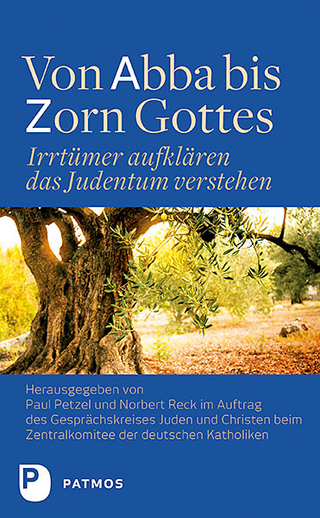Reform Judaism and Darwin
How Engaging with Evolutionary Theory Shaped American Jewish Religion
Seiten
Nach dem Zweiten Weltkrieg hat Ernst Ludwig Ehrlich (1921–2007) herausragende israelische Gelehrte in englisch- und deutschsprachigen Veröffentlichungen in Europa und Nordamerika bekannt gemacht. Die zu diesem Zweck von ihm begründete Reihe Studia Judaica bietet heute ein Forum für wissenschaftliche Studien und Editionen aus allen Epochen der jüdischen Religionsgeschichte.
Darwin provoked Jewish as well as Christian thinkers so that many felt obliged to establish oppositional, alternative, synthetic, or complimentary models relating Jewish religion to his theory of natural selection. This book examines a range of leading nineteenth- and early twentieth-century American progressive Jewish thinkers, with the primary focus being rabbis Kohler, Wise, Hirsch, Krauskopf, and Hahn, although many others are covered. Key themes include the widespread commitment to universal evolutionism, that is, the application of biological evolutionary theory to other realms (e.g. history, religion, cosmic), and the particular fascination with the evolution of ethical systems within human societies, bearing in mind mankind’s bestial origins and the new challenges for understanding religious authority and revelation. It is argued that Reform Jewish discussions about the nature of God have been more profoundly shaped by engagement with evolutionary theory than has been recognized before, and that evolutionary thought provides the key framework for understanding Reform Judaism itself. The precise nature of Jewish Reform engagement with Christian proponents of theistic evolution are important, as are their interest in alternative evolutionists to Darwin, such as Spencer and Haeckel.
Darwin provoked Jewish as well as Christian thinkers so that many felt obliged to establish oppositional, alternative, synthetic, or complimentary models relating Jewish religion to his theory of natural selection. This book examines a range of leading nineteenth- and early twentieth-century American progressive Jewish thinkers, with the primary focus being rabbis Kohler, Wise, Hirsch, Krauskopf, and Hahn, although many others are covered. Key themes include the widespread commitment to universal evolutionism, that is, the application of biological evolutionary theory to other realms (e.g. history, religion, cosmic), and the particular fascination with the evolution of ethical systems within human societies, bearing in mind mankind’s bestial origins and the new challenges for understanding religious authority and revelation. It is argued that Reform Jewish discussions about the nature of God have been more profoundly shaped by engagement with evolutionary theory than has been recognized before, and that evolutionary thought provides the key framework for understanding Reform Judaism itself. The precise nature of Jewish Reform engagement with Christian proponents of theistic evolution are important, as are their interest in alternative evolutionists to Darwin, such as Spencer and Haeckel.
Daniel Langton, Universität Manchester, Großbritannien.
Daniel Langton, University of Manchester, United Kingdom.
| Erscheinungsdatum | 23.07.2019 |
|---|---|
| Reihe/Serie | Studia Judaica ; 111 |
| Verlagsort | Berlin/Boston |
| Sprache | englisch |
| Maße | 155 x 230 mm |
| Gewicht | 325 g |
| Themenwelt | Geisteswissenschaften ► Religion / Theologie ► Judentum |
| Schlagworte | American Judaism. • American Judaism. • Austausch zwischen Juden und Christen • Evolution-creationism • Jüdisch-Christliches Verhältnis • Kreationismus • Reform Judaism • Reform Judaism • Reformjudentum • Religion-science |
| ISBN-10 | 3-11-065913-1 / 3110659131 |
| ISBN-13 | 978-3-11-065913-9 / 9783110659139 |
| Zustand | Neuware |
| Informationen gemäß Produktsicherheitsverordnung (GPSR) | |
| Haben Sie eine Frage zum Produkt? |
Mehr entdecken
aus dem Bereich
aus dem Bereich
Irrtümer aufklären - das Judentum verstehen
Buch | Softcover (2024)
Patmos Verlag
CHF 15,90
das vererbte Trauma in den Familien der Holocaust-Überlebenden
Buch | Hardcover (2024)
Societäts-Verlag
CHF 27,95
ein Zerrbild mit fatalen Folgen
Buch | Softcover (2023)
Claudius (Verlag)
CHF 34,90




